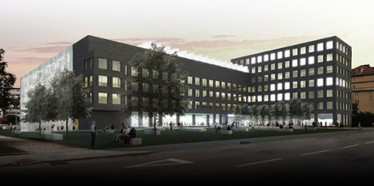
Informatics colloquium 19. 12. Navigating the Space of Visualizations
Informatics colloquium 19. 12. 2017, 14:00 lecture hall D2
prof. Stefan Bruckner, Faculty of Mathematics and Natural Sciences, University
of Bergen
Navigating the Space of Visualizations
Anstract: Considering the vast amounts of data involved in many scientific
disciplines and industrial applications, it is essential to provide effective
and efficient means for forming a mental model of the underlying phenomenon. The
term "visualization" refers to the process of extracting meaningful information
from data and constructing a visual representation of this information.
While the concept of using images to communicate complex phenomena of course
predates the development of digital technology by millennia, over the past
decades the field of visualization has firmly established itself as an important
and constantly expanding discipline within computer science. Computer-based
Visualization seeks to provide interactive graphical data representations,
taking advantage of the extraordinary capability of the human brain to process
visual information. Advanced visualization methods now play an an important role
in the exploration, analysis, and presentation of data in many fields such as
medicine, biology, geology, or engineering. This development, however, has also
lead to the fact that there is now a vast number of often very specialized
techniques to visualize different types of data tailored towards specific tasks.
For non-experts it becomes non-trivial to choose appropriate methods that will
provide the optimal answers to their questions.
In this talk, I will discuss previous and ongoing research on how we can explore
and navigate the space of visualizations itself. By consider the interplay
between data, visualization algorithms, their parameters, perception, and
cognition as a complex phenomenon that deserves study in its own right, we are
making progress in providing goal-oriented interfaces for visual analysis. For
instance, we can make the modification of input parameters of visualization
algorithms more intuitive by normalizing their perceived effects over the entire
value range, and provide visual guidance about their influence. Furthermore, by
incorporating additional knowledge into the visualization process, we can infer
information about the goals of a user, and develop smarter systems that
automatically suggest appropriate visualization techniques. This line of
investigation leads us along the path towards a new type of visual data science,
where automated data analysis approaches such as deep learning are tightly
coupled with interactive visualization techniques to exploit their complementary
advantages for knowledge discovery in data-driven science.
Short biography: Stefan Bruckner is professor in visualization at the Department
of Informatics of the University of Bergen, Norway. Prior to his appointment in
Bergen, he was an assistant professor at the TU Wien, Austria where he also
received his habilitation (2012) and PhD (2008). His research focuses on
interactive visualization and he has made important contributions to several
areas such as illustrative methods, parameter space exploration, feature
detection, and knowledge-based interfaces. Prof. Bruckner has successfully led
several research projects including industry collaborations with partners such
as AGFA HealthCare and GE Healthcare. His results were published in the premier
venues for visualization research and have to date received 8 best paper awards
and honorable mentions at international events. He won the Karl-Heinz-Höhne
Award for Medical Visualization and received the prestigious Eurographics Young
Researcher Award. As an active member of the international scientific community,
Prof. Bruckner regularly serves on the program committees of the leading
conferences in visualization and computer graphics. He was program co-chair of
EuroVis, PacificVis, VCBM, and the Eurographics Medical Prize, and currently
serves on the editorial board of Computers & Graphics. He is a member of the
IEEE Computer Society, ACM SIGGRAPH, and Eurographics.